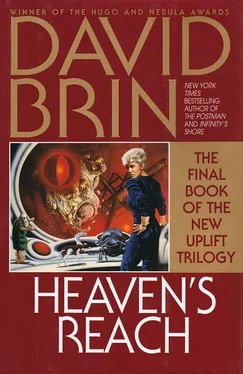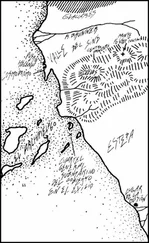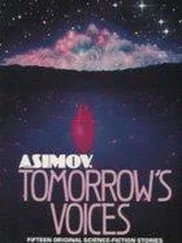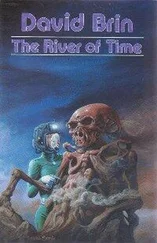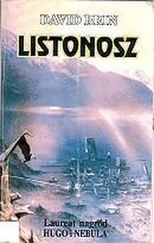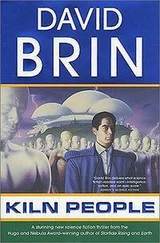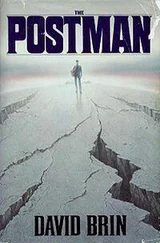David Brin - Heaven's Reach
Здесь есть возможность читать онлайн «David Brin - Heaven's Reach» весь текст электронной книги совершенно бесплатно (целиком полную версию без сокращений). В некоторых случаях можно слушать аудио, скачать через торрент в формате fb2 и присутствует краткое содержание. ISBN: , Жанр: Фантастика и фэнтези, на английском языке. Описание произведения, (предисловие) а так же отзывы посетителей доступны на портале библиотеки ЛибКат.
- Название:Heaven's Reach
- Автор:
- Жанр:
- Год:неизвестен
- ISBN:978-0-30757350-6
- Рейтинг книги:4 / 5. Голосов: 1
-
Избранное:Добавить в избранное
- Отзывы:
-
Ваша оценка:
- 80
- 1
- 2
- 3
- 4
- 5
Heaven's Reach: краткое содержание, описание и аннотация
Предлагаем к чтению аннотацию, описание, краткое содержание или предисловие (зависит от того, что написал сам автор книги «Heaven's Reach»). Если вы не нашли необходимую информацию о книге — напишите в комментариях, мы постараемся отыскать её.
Heaven's Reach — читать онлайн бесплатно полную книгу (весь текст) целиком
Ниже представлен текст книги, разбитый по страницам. Система сохранения места последней прочитанной страницы, позволяет с удобством читать онлайн бесплатно книгу «Heaven's Reach», без необходимости каждый раз заново искать на чём Вы остановились. Поставьте закладку, и сможете в любой момент перейти на страницу, на которой закончили чтение.
Интервал:
Закладка:
Lieutenant Tsh’t murmured.
“A sssolar sail!”
“Is that what you call it?” Sara nodded. “Imagine machines arriving through the transfer point as compact objects, plummeting down to Izmunuti, then unfurling such sails and catching a free ride back to the t-point, gaining layers of this molecularly unique carbon, and other stuff along the way. Energy expenditures per ton of yield would be minimal!”
The whirling Niss hologram edged forward.
“Your hypothesis suggests an economical resource-gathering technique, providing the mechanoids needn’t make more than one simple hyperspatial transfer, coming or going. There are cheap alternatives in industrialized regions of the Five Galaxies, but here in Galaxy Four, industry is currently minimal or nil, due to the recent fallow-migration—” The Niss paused briefly.
“Mechanoids would be ideal contractors for such a harvesting chore, creating special versions to do the job swiftly, with minimal mass. It explains why their drives and shields seem frail before the rising storms. They had no margin for the unexpected.”
Gillian saw that just half of the orange glitters remained, struggling to flee Izmunuti’s gravity before more plasma surges caught them. The three purple dots had already climbed toward the mechanoid convoy, ascending with graceful ease.
“What about the Zang?” she asked.
“I surmise they are the mechanoids’ employers. Our Library says Zang groups sometimes hire special services from the Machine Order. Great clans of oxygen breathers also do it, now and then.”
“Well, it seems their plans have been ripped,” commented Suessi. “Not much cargo getting home, this time.”
Pensive whistle ratchets escaped the gray dolphin in the water-filled tunnel — not Trinary, but the scattered clicks a cetacean emits when pondering deeply. Gillian still felt guilty about asking Kaa to volunteer for this mission, since it meant abandoning his lover to danger on Jijo. But Streaker needed a first-class pilot for this desperate ploy.
“I concur,” the whirling Niss hologram concluded. “The Zang will be in a foul mood after this setback.”
“Because they suffered economic loss?” Tsh’t asked.
“That and more. According to the Library, hydrogen breathers react badly to surprise. They have slower metabolisms than oxy-life. Anything unpredictable is viscerally unpleasant to them.
“Of course, this attitude is strange to an entity like me, programmed by the Tymbrimi to seek novelty! Without surprise, how can you tell there is an objective world? You might as well presume the whole universe is one big sim—”
“Wait a minute,” Gillian interrupted, before the Niss got sidetracked in philosophy. “We’re all taught to avoid Zang as dangerous, leaving contact to experts from the Great Institutes.”
“That is right.”
“But now you’re saying they may be especially angry? Possibly short-tempered?”
The Niss hologram coiled tensely.
“After three years together, Dr. Baskin — amid growing familiarity with your voice tones and thought patterns — your latest inquiry provokes uneasy feelings.
“Am I justified to be wary?
“Do you find the notion of short-tempered Zang … appealing?”
Gillian kept silent. But she allowed a grim, enigmatic smile.
Harry
FIVE EARTH YEARS HAD PASSED ON HIS PERsonal duration clock since he took the irrevocable step, standing amid volunteers from fifty alien races, laboriously mouthing polyglottal words of a memorized oath that had been written ages ago, by some species long extinct. Upon joining the Observer Corps, Harry’s life didn’t simply shift — it leaped from the riverbed of his genetic lineage, transferring loyalty from his birth planet to an austere bureaucracy that was old when his distant ancestors still scurried under Triassic jungle canopies, hiding from dinosaurs.
Yet, during training he was struck by how often other students sought him out with questions about Earthclan, whose struggles were the latest riveting interstellar penny-drama. Would the newest band of unprotected, sponsorless “wolflings” catch up with starfaring civilization in time to forestall the normal fate of upstarts? Despite Terra’s puny unimportance, this provoked much speculation and wagering.
What was it like — his fellow acolytes asked — to have patrons like humans, who taught themselves such basic arts as speech, spaceflight, and eugenics? As a neochimp, Harry was junior in status to every other client-citizen at the base, yet he was almost a celebrity, getting hostility from some, admiration from others, and curiosity from nearly all.
In fact, he couldn’t tell his classmates much about Terragens Civilization, having spent just a year among the talky neo-chimpanzees of Earth before dropping out of university to sign on with the Navigation Institute. His life was already one of exile.
He had been born in space, aboard a Terragens survey vessel. Harry’s vague memories of TSS Pelenor were of a misty paradise lost, filled with high-tech comforts and warm places to play. The crew had seemed like gods — human officers, neochim and neo-dolphin ratings … plus a jolly, treelike Kanten advisor — all moving about their tasks so earnestly, except when he needed to be cuddled or tickled or tossed in the air.
Then, one awful day, his parents chose to debark and study the strange human tribes on a desolate colony world — Horst. That ended Harry’s part in the epochal voyage of the Pelenor, and began his simmering resentment.
Memories of starscapes and humming engines became muzzy, idealized. Throughout childhood on that dusty world, the notion of space travel grew more magical. By the time Harry finally left Horst, he was shocked by the true sterile bleakness that stretched between rare stellar oases.
I remember it differently, he thought, during the voyage to Earth. Of course that memory was a fantasy, formed by an impressionable toddler. At university, instructors taught that subjective impressions are untrustworthy, biased by the mind’s fervent wish to believe.
Still, the thirst would not be slaked. An ambition to seek paradise in other versions of reality.
The bananas held him trapped for days.
If the allaphor had been less personal, Harry might have fought harder. But the image was too explicitly pointed to ignore. After the first debacle, when the station nearly foundered, he decided to wait before challenging the reef again.
Anyway, this wasn’t a bad site to observe from. In a synergy between this strange continuum and his own mind, the local region manifested itself as a high plateau, overlooking a vast, undulating sea of purple tendrils. Black mountains still bobbed in the distance, though some of the “holes” in the red-blue sky became drooping dimples, as if the celestial dome had decided to melt or slump.
There were also life-forms — mostly creatures of the Memetic Order. Shapes that fluttered, crawled, or shimmered past Harry’s octagonal platform, grazing and preying on each other, or else merging or undergoing eerie transformations before his eyes. On all other dimensional planes, memes could only exist as parasites, dwelling in the host brains or mental processors of physical beings. But here in E Space, they roamed free, in a realm of palpable ideas.
“Your imagination equips you to perform the duties of a scout,” Wer’Q’quinn explained during Harry’s training. “But do not succumb to the lure of solipsism, believing you can make something happen in E Space simply by willing it. E Space can sever your life path, if you grow obstinate or unwary.”
Harry never doubted that. Watching memiforms slither across the purple steppe, he passed the time speculating what concepts they contained. Probably, none of the creatures were sapient, since true intelligence was rare on any level of reality. Yet, each of the memes crossing before him manifested a single thought, unconstrained by any organic or electronic brain — a self-contained idea with as much structured complexity as Harry held in his organs and genetic code.
Читать дальшеИнтервал:
Закладка:
Похожие книги на «Heaven's Reach»
Представляем Вашему вниманию похожие книги на «Heaven's Reach» списком для выбора. Мы отобрали схожую по названию и смыслу литературу в надежде предоставить читателям больше вариантов отыскать новые, интересные, ещё непрочитанные произведения.
Обсуждение, отзывы о книге «Heaven's Reach» и просто собственные мнения читателей. Оставьте ваши комментарии, напишите, что Вы думаете о произведении, его смысле или главных героях. Укажите что конкретно понравилось, а что нет, и почему Вы так считаете.
